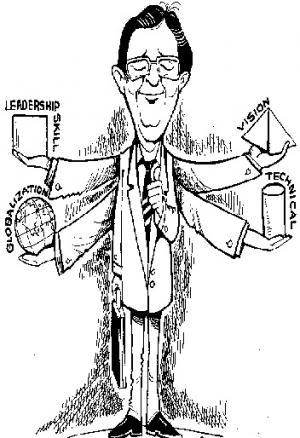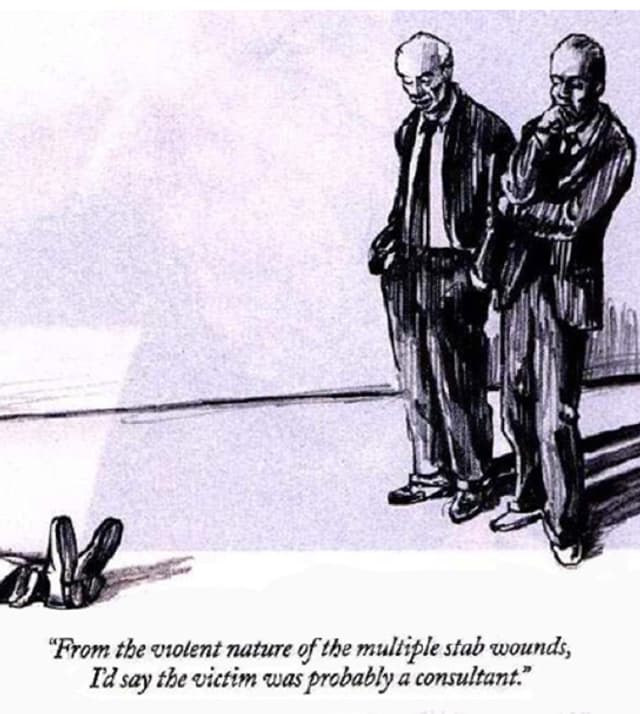How would you kick-start your ‘nonprofit’ career as a consultant
On several occasions while talking to my peers, I have heard people coveting the role of a ‘consultant’. The reasons quoted are diverse – an opportunity to be part of a dynamic problem-solving team, be recognised as a specialist, or having the flexibility to do several things at one time.
- Written by
- Sudeshna Mukherjee
- Added
- May 20, 2014

I have been working as a nonprofit professional for a variety of NGOs, both national and international, for close to seven years now in all areas of fundraising, not just raising money but also pro bono work, gifts in kind, etc. My first job was with GiveIndia where I reviewed different organisations overall programmes, including their expenses and income to see if they were on mission as they claimed when they joined the site. More recently I have done the same for GlobalGiving. Without doubt, I have enjoyed my time working for a cause and sometimes many causes. However, I am beginning to wonder what it would be like to be a ‘consultant’ full-time. Whilst talking to an experienced consultant, I was advised to assess two routes before making that giant leap.
- Be absolutely sure this is the best decision.
- People who fail in consultancy as a career often go back to the client side. I should be prepared to face failures.
That takes me back to the big question – how do you break into a career as a nonprofit consultant? In April 2012, I was at the Association of Fundraising Professional’s conference in Vancouver, BC to assist Bernard Ross, from the Management Centre (=mc) in the UK, during his master class and also to attend the conference. There, I came across many consultants with different levels of experience. From them, I learned what made others get into consultancy and how their journey has been so far. Here are their insights.
1. Be an apprentice.
There are fewer formal education opportunities; the best way to learn the ropes is to start working with more experienced consultants. Finding a mentor and being open to coaching stood out as potential for getting into nonprofit consultancy. Younger people working in technology might have an edge due to the dynamic nature of the sector. Otherwise, ways to get noticed are doing an internship at an established firm that provides entry-level work options with nonprofits, or as an assistant to an expert in the area. Campbell & Company in Chicago offer internships.
2. An experienced fundraiser is not the same as a good consultant
Like any entrepreneur, someone starting his or her own nonprofit consultancy should be aware of the risks and need for a sustainable source of income. I was told that before venturing out on my own, I should have a sizeable number of years of work experience at a nonprofit with a good reputation, which could ensure a better knowledge and understanding of the clients’ needs and overall reduce risk. This would also help me to get a better grip on the opportunities and complexities of the problems at hand. Being an experienced fundraiser is not the same as being a good consultant. Sometimes it’s tough to move from a monthly pay cheque to a low daily rate before you manage to establish your track record as a consultant. Knowing what you’re getting into may help from a practical standpoint. This is not for everyone.
3. Be willing to adapt to changing needs

I was given a word of caution for people like me coming from structured working hours: consultancy isn’t a nine to five job. It is more of a calling, involving hard work, dedication and passion since consultants are retained by the client’s organisation with high expectations. Large firms often require their consultants to work on multipe accounts at the same time and to travel frequently. Customers may expect 24-hour turn around and advice on demand. Travelling for days at a time could be difficult for some people as they would be away from family and friends. Ability to multi-task and adapt are other keys to success, especially when client and consultant are from different backgrounds. Consultants are expected to wear different hats and be able to provide both generic and customised expertise. The diversity can be challenging and fulfilling at the same time, which is something to be aware of when dealing with clients from different backgrounds.
4. Find your ‘niche’
A clue to spotting the new consultant is the grand website offering consultancy in everything and anything – from planned giving to major donors, from legacies to individual giving, from corporate to event. Instead of working for one particular cause for an extended period of time, consultancy offers diversity across sectors. However, this doesn’t mean anyone can offer consultancy in everything. I was advised that, in the initial days, it is important to explore options, type of consultancy and clients that I would like. It could be education, health care, the arts, anything. Taking the chance to identify my niche and being an expert in an area that suits me could help in making an informed choice.
5. Develop good marketing and client servicing skills
A go-getter comfortable in talking about his or her USP is more likely to be hired than a person with an impressive track record waiting to be noticed. Contacting local networks and finding ways to meet key-decision makers and potential clients will help to find new business. While getting new clients might be a big challenge, maintaining that account is even bigger. It is important to have a good stewardship and retention strategy: reputation is everything. A flourishing consultant needs to keep networking even when he or she has a bevy of clients.
6. Don’t make false promises

It’s important to set expectations before finalising a contract. Good consultants are always honest about what they can do and what they can’t. Once they’ve agreed to their deliverables they stick to them: on time and on target. They are always able to objectively share what goals are attainable for them with the client. The ability to deliver as per the contract is the key to success.
7. If the horse is dead, dismount!
Practical consultants knows the distinction between a ‘dead horse’ and ‘sacred cows’ and where to focus their energies. In the nonprofit sector, there aren’t too many consultancy firms willing to hire people without much experience or track record of ‘problem-solving’ and ‘ability to shepherd projects to logical conclusions’. Sometimes a project may go hay-wire, so a good consultant must be able to consolidate and get projects back on track. There’s a very small margin of profit while being retained by a nonprofit and, therefore, little room for mistake. Someone with the wisdom and knack of dealing with the problem and who knows when to move on will last longer.
8. Know that expertise is limited, but listening is limitless
The mind-set of the ‘expert’ is going to lead you astray. There is a Zen proverb: ‘In the beginner’s mind there are many possibilities, in the expert’s mind there are few.’ We should try to listen a lot and guide others into doing something that will produce lessons, if not results.
9. Managing money, managing your business
This one is particularly applicable to folk planning to work for themselves. Pricing is quite often a concern and they should be able to explain why they charge what they charge. Typically, you are expected to be in more or less the same price range as your competition. There might be budget cuts as seen during a recession and consultants have to be flexible to ensure their business stays afloat by pricing competitively. However, you also need to factor in experience and make a case for your added value before the client’s board, executive director and senior management. As a consultant, I am there to help increase capacity and make my client’s organisation more sustainable. If I do this I am also taking care of of my own business.
10. Keep up with market trends.
Read extensively, follow successful campaigns, be in the know of how to price your services and seek the counsel of other practitioners. Attend conferences and other events where there is an opportunity to meet and interact with key players in the sector who are also there to showcase their work, scout for information and gain knowledge about the nonprofit market. Last but not the least, never underestimate the potential of a good conversation. It can set the ball rolling in a whole new direction.
So now that I have these ten commandments from leading consulants, I feel a lot more confident to start my career as a consultant. As I do that, I am aware of the need for perception management – of being able to create a greater value and rise above the ranks of the proverbial consultant considered worse than a lab rat.
Resources:
1. Reading:
- Flawless Consulting: A Guide to Getting Your Expertise Used, Peter Block, Jossey-Bass, USA, 2011.
- Getting Started in Consulting, Alan Weiss PhD, John Wiley, USA, 2000.
- Helping: How to Offer, Give, and Receive Help, Edgar H Schein, Berrett-Koehler, USA, 2099.
- Managing the Professional Service Firm – David H Maister, Simon & Schuster, UK, 2003.
- Nonprofit Consulting Essentials: What Nonprofits and Consultants Need to Know, Penelope Cagney, Jossey-Bass, USA, 2010.
2. Consultant associations:
- Institute of Management Consultants, USA (www.imcusa.org).
- Association of Philanthropic Counsel, USA (www.apcinc.org).
- The Giving Institute, USA (www.givinginstitute.org).
- The Alliance for Nonprofit Management, USA (www.allianceonline.org).
- EUConsult, The Netherlands (www.euconsult.org).
- Association of Fundraising Consultants (www.euconsult.org).
I would like to thank the following people for allowing me to interview them:
- Tania Little, Second Harvest.
- Alan R Hutson, the Monument Group.
- Gail Perry, Gail Perry Associates.
- Harvey McKinnon, Harvey McKinnon Associates.
- Tom Wilson, Campbell & Company.
- Rachel A Schaefer, Bentz Whaley Flessner.
- Marianne Briscoe, Brakeley Briscoe Inc.
- Jason Pinkstaff and Kelley C Albanese, CCS Fundraising.
- Penelope Cagney, the Cagney Company.

















